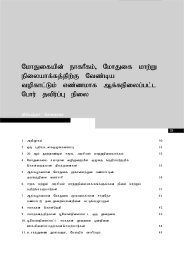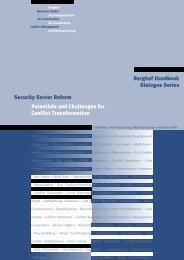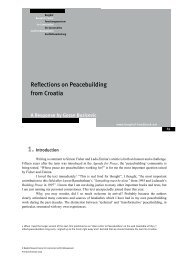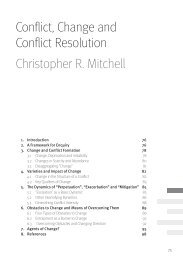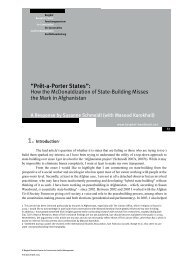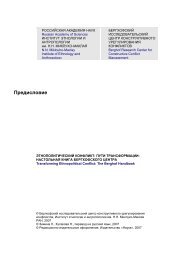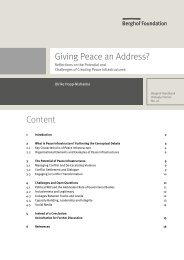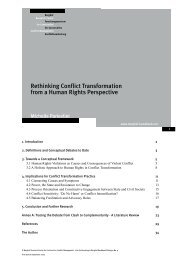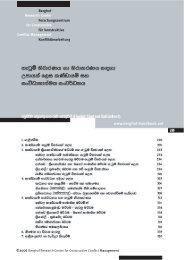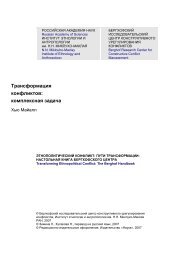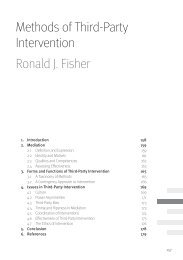Human rights and conflict transformation: The challenges of just peace
Human rights and conflict transformation: The challenges of just peace
Human rights and conflict transformation: The challenges of just peace
You also want an ePaper? Increase the reach of your titles
YUMPU automatically turns print PDFs into web optimized ePapers that Google loves.
110<br />
Bergh<strong>of</strong> H<strong>and</strong>book Dialogue No. 9<br />
<strong>of</strong> “<strong>peace</strong> <strong>and</strong> <strong>just</strong>ice”, even though the latter is at times used as a catchy label to refer to the former.<br />
In my view, too much goes missing when doing so.<br />
At the core <strong>of</strong> the <strong>peace</strong> <strong>and</strong> <strong>just</strong>ice debate <strong>and</strong> the tensions observed by Gomes-Mugumya<br />
<strong>and</strong> others is a very specific dilemma: the pursuit <strong>of</strong> accountability for serious violations <strong>of</strong> human<br />
<strong>rights</strong> <strong>and</strong> international humanitarian law in situations <strong>of</strong> <strong>conflict</strong> where an end to violence is badly<br />
needed. It is thus concerned with the imperative to establish negative <strong>peace</strong> <strong>and</strong> the risk that those<br />
responsible for violence may dem<strong>and</strong> immunity in exchange for agreeing to lay down arms. As<br />
such, it focuses on one aspect <strong>of</strong> <strong>just</strong>ice: criminal or retributive <strong>just</strong>ice. Other aspects <strong>of</strong> <strong>just</strong>ice such<br />
as institutional reform <strong>and</strong> redistributive <strong>just</strong>ice, feature too seldom in this debate. Yet they are <strong>just</strong><br />
as important to establishing the rule <strong>of</strong> law, rehabilitating victims, survivors <strong>and</strong> their relatives, <strong>and</strong><br />
legitimising state institutions in a post-settlement society. While I am convinced <strong>of</strong> the need to fight<br />
impunity, 4 an exclusive focus on investigations, prosecutions <strong>and</strong> punishment for doing so disregards<br />
that this strategy primarily targets the consequences <strong>of</strong> <strong>conflict</strong>, not its causes. It also only deals<br />
with violations <strong>of</strong> civil <strong>and</strong> political <strong>rights</strong>. This is problematic given the impact <strong>of</strong> violent <strong>conflict</strong><br />
on people’s economic <strong>and</strong> social <strong>rights</strong>, <strong>and</strong> the extent to which violations <strong>of</strong> these may have been<br />
at the root <strong>of</strong> what caused the <strong>conflict</strong>. Lastly, the emphasis on retributive <strong>just</strong>ice is based on the<br />
assumption that it acts as deterrence <strong>and</strong> is as such key to prevention <strong>of</strong> future crimes. Empirical<br />
evidence for this is still lacking, however. Thus, one <strong>of</strong> my concerns in relation to the debate on<br />
<strong>peace</strong> <strong>and</strong> <strong>just</strong>ice regards the narrow conception <strong>of</strong> <strong>just</strong>ice that drives many contributions <strong>and</strong> also<br />
informs Gomes-Mugumya’s <strong>and</strong> García-Durán’s comments on this issue. <strong>The</strong> UN-endorsed Joinet/<br />
Orentlicher principles to combat impunity identify four areas to address: the right to know, the right<br />
to <strong>just</strong>ice, the right to reparation <strong>and</strong> the guarantee <strong>of</strong> non-recurrence. In my view, more attention<br />
should be paid to all four rather than focusing mostly on one.<br />
In addition, it is important to note that even when it comes to criminal <strong>just</strong>ice, the situation is<br />
less straightforward than may seem at first sight. As noted in the literature review, sequencing is now<br />
recognized as critical; international law does not prescribe that investigations <strong>and</strong> prosecutions must<br />
take place within a specific time frame. Without suggesting that waiting for 30 years for trials to be<br />
conducted is desirable, recent developments in Argentina <strong>and</strong> Chile show that <strong>just</strong>ice delayed is not<br />
necessarily <strong>just</strong>ice denied. Also, the suggestion that <strong>peace</strong> requires granting amnesty <strong>and</strong> is therefore<br />
by definition irreconcilable with <strong>just</strong>ice is too simplistic, as is the notion that granting amnesty<br />
means maintaining impunity. International law recognizes that it may be legitimate <strong>and</strong> advisable<br />
for a state to <strong>of</strong>fer amnesty to individuals who have taken up arms against it. What is prohibited is<br />
blanket amnesty <strong>and</strong> amnesty for the most serious crimes – genocide, crimes against humanity <strong>and</strong><br />
war crimes; these must be investigated <strong>and</strong>, if warranted, prosecuted. (<strong>The</strong> United Nations has, for<br />
example, issued guidelines that its representatives cannot support an amnesty for these crimes, nor<br />
for the wider category <strong>of</strong> “gross human <strong>rights</strong> violations”.) It is thus the kind <strong>of</strong> amnesty that must be<br />
discussed, not amnesty as such. A person’s position in the chain <strong>of</strong> comm<strong>and</strong> also needs to be taken<br />
into account; investigation <strong>and</strong> prosecution are to focus on those who bear the greatest responsibility<br />
for the serious crimes committed. <strong>The</strong> Rome Statute <strong>of</strong> the International Criminal Court (ICC)<br />
recognizes further that the first responsibility for addressing serious crimes lies with the national<br />
state <strong>and</strong> the parties to the <strong>conflict</strong>. Only when they are unwilling or incapable <strong>of</strong> doing so, should<br />
4 In Nepal I have seen how impunity for past <strong>and</strong> present human <strong>rights</strong> violations fits into a much wider pattern <strong>of</strong> failure to<br />
hold individuals accountable for their actions, be they police <strong>of</strong>ficers torturing suspects; members <strong>of</strong> the youth branches <strong>of</strong><br />
political parties assaulting journalists <strong>and</strong> human <strong>rights</strong> defenders; local government <strong>of</strong>ficials appropriating public funds; judges<br />
accepting bribes; elites owning l<strong>and</strong> far beyond the legal ceiling; or political leaders pursuing their own narrow interests rather<br />
than those <strong>of</strong> their larger constituencies. This general lack <strong>of</strong> accountability has negatively affected the <strong>peace</strong> process, both<br />
before <strong>and</strong> since the signing <strong>of</strong> the <strong>peace</strong> agreement, <strong>and</strong> is a major obstacle to the further democratisation <strong>of</strong> Nepal.






